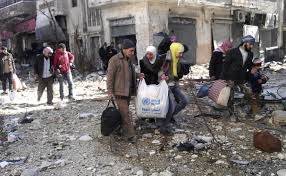 The first civilians were evacuated Friday from a rebel-held area of the Syrian city of Homs after more than a year and a half of struggling to survive under a government blockade, a deal that could bolster confidence ahead of a second round of peace talks.
The first civilians were evacuated Friday from a rebel-held area of the Syrian city of Homs after more than a year and a half of struggling to survive under a government blockade, a deal that could bolster confidence ahead of a second round of peace talks.
Aid workers said they had heard harrowing stories from the more than 80 people who were evacuated from the besieged Old City — with some recounting how they had been surviving on as little as a spoonful of wheat a day and others saying they had been forced to eat weeds.
A U.N.-brokered agreement for a three-day cease-fire, to allow civilians out and then aid to come in, came just days ahead of the resumption of peace talks in Geneva. The Syrian government confirmed Friday that it would attend.
The first round, which marked the first time the two sides had sat at the negotiating table during the three-year conflict, failed to deliver tangible results.
Western diplomats and aid workers have given the agreement a muted welcome, while urging the Syrian government to allow unfettered humanitarian access.
State television showed civilians, largely elderly people and women, wrapped in blankets and being ushered onto buses. One evacuee was taken in an ambulance.
The 83 people the United Nations said were evacuated to places of their choosing are a fraction of the 2,500 people it estimates are holed up in Homs’s Old City. Humanitarian workers said they handed the evacuees juice, high-energy biscuits and ready-to-eat meals as they left the city.
Dina Elkassaby, a spokeswoman for the World Food Program, said its staff had reported that many of the evacuees were in “very, very bad shape,” with children showing signs of malnutrition.
“One elderly man told us he’d just been eating a spoonful of bulgur wheat a day. He broke down crying and said his wife had passed away a week earlier,” she said. “He was sure lack of food meant she wasn’t able to fight the illness.”
Supplies of food and other essentials to areas of the Old City have been stymied since June 2012, with the opposition accusing the government of using starvation tactics to crush support for rebels. Areas of the Damascus suburbs are under similar strangleholds.
Residents say they have survived on little but olives and what could be scavenged from abandoned houses. Reports of deaths from starvation remain unconfirmed.
A total of 200,000 Syrian citizens are living under siege, according to the United Nations. The vast majority are cut off by government forces, though rebels have been criticized for using similar tactics in areas of northern Syria.
Only women, children younger than 15 and adults older than 55 were allowed to leave Friday. Syrian state television reported that hundreds more were expected to be evacuated in coming days.
However, residents said some had decided to stay so as not to split up families and because of fears about what might happen to them if they left. Others are holding out for food aid to be delivered inside the besieged areas, as outlined in the second stage of the deal. The World Food Program said it had 500 food parcels and 500 bags of wheat flour in Homs poised for delivery, which it said it hopes could start as soon as Saturday. Rebels say that the deal requires that they submit a list of names of those who have chosen to stay in the area before aid is delivered.
“The demands of the civilians were never to leave their homes nor their lands,” said Waleed al-Fares, an activist in the Old City. He said one group of civilians had come under fire while trying to leave, while the United Nations confirmed “isolated reports of gunfire” during evacuations.
A deal on aid to besieged areas of Homs was a planned confidence-building exercise at the first round of peace talks in Geneva, but an agreement failed to materialize during the talks.
Valerie Amos, the U.N. emergency relief coordinator, described Friday’s evacuation as a “small but important step towards compliance with international humanitarian law.”
The Syrian government has come under pressure from its allies Russia and Iran to make humanitarian concessions.
But Damascus was keen to portray the humanitarian deal outside the framework of talks, with pundits and parliament members taking to the airwaves to tout the deal as evidence of the government’s ongoing efforts to aid civilians.
However, the United States and its allies have been clear in apportioning blame to the government for the Homs siege.
“There is no suggestion that the regime has done what is required under international law, which is to allow unconditional humanitarian access,” said one Western diplomat who declined to give his name so he could speak candidly on a sensitive subject. “We are deeply concerned about the population that remains.”
Washington Post
Photo: Civilians carry their belongings as they walk toward a meeting point to be evacuated from a besieged area of Homs, Syria, in the first stage of a planned three-day humanitarian cease-fire in the city, which has suffered some of the worst devastation of Syria’s three-year conflict.
Yazan Homsy / Reuters

Leave a Reply
You must be logged in to post a comment.